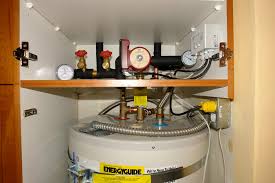How Can I Efficiently Maintain My Water Heater to Extend Its Lifespan?
by Admin

Do you ever feel like your water heater has a ticking time bomb inside, just waiting to explode? Well, fear not! In this article, we're going to show you how to efficiently maintain your water heater and extend its lifespan.
By following a few key maintenance tasks and implementing some tips for improving efficiency, you'll have hot water flowing for years to come.
So, grab your toolbox and let's get started!
Importance of Regular Maintenance
To ensure the longevity of your water heater, it's crucial that you regularly maintain it. By performing routine maintenance, you can prevent potential issues and extend the lifespan of your water heater.
Regular maintenance includes checking the pressure relief valve, flushing the tank to remove sediment buildup, and inspecting the anode rod. The pressure relief valve is responsible for releasing excess pressure, so it's important to ensure it's working properly.
Flushing the tank helps remove sediment that can accumulate over time and affect the efficiency of your water heater. Inspecting the anode rod is also essential, as it helps prevent corrosion inside the tank.
Key Maintenance Tasks for Water Heaters
Regularly checking and flushing the tank helps to prevent sediment buildup and maintain the efficiency of your water heater. By taking the time to perform these key maintenance tasks, you can extend the lifespan of your water heater and ensure it continues to provide hot water when you need it.
Here are four important tasks to include in your water heater maintenance routine:
- Inspect the pressure relief valve to ensure it is functioning properly.
- Test the temperature and pressure settings to make sure they are set at appropriate levels.
- Check the anode rod for signs of corrosion and replace it if necessary.
- Clean the intake screen to prevent debris from clogging the system.
Tips for Improving Water Heater Efficiency
Checking and adjusting the temperature and pressure settings can help improve the efficiency of your water heater. By doing this simple task, you can ensure that your water heater is operating at its optimal level.
Start by checking the temperature setting on your water heater. It should be set to around 120 degrees Fahrenheit to prevent scalding and reduce energy consumption. If it's set higher, adjust it accordingly.
Next, check the pressure relief valve. This valve is responsible for releasing excess pressure in the tank. Make sure it's functioning properly and not leaking.
Additionally, consider insulating your water heater and the pipes connected to it. This can help reduce heat loss and improve efficiency.
Taking these steps will not only save you money on energy bills but also extend the lifespan of your water heater.
Professional Maintenance Services and DIY Options
Hiring a professional or doing it yourself are both options for maintaining your water heater. It's important to keep your water heater in good shape to avoid costly repairs or replacements.
Here are some ways you can efficiently maintain your water heater:
- Flush the tank regularly to remove sediment buildup.
- Check the pressure relief valve to ensure it's functioning properly.
- Insulate the pipes and tank to improve energy efficiency.
- Monitor the temperature settings to prevent overheating.
Frequently Asked Questions
How Often Should I Flush My Water Heater?
You should flush your water heater at least once a year to remove sediment buildup and improve its efficiency. Regular flushing will help extend the lifespan of your water heater and prevent potential issues.
Can I Use Vinegar to Clean My Water Heater?
Yes, you can use vinegar to efficiently clean your water heater. It helps remove mineral buildup and extends its lifespan. Regular maintenance like this will ensure your water heater runs smoothly.
What Should I Do if My Water Heater Is Making Strange Noises?
If your water heater is making strange noises, it could be a sign of sediment buildup or a failing component. You should immediately turn off the heater, check for any leaks, and contact a professional for further inspection and repairs.
Is It Necessary to Insulate My Water Heater?
Insulating your water heater is necessary to increase its efficiency and extend its lifespan. It reduces heat loss, saving you money on energy bills. Imagine a scenario where you save up to 20% on heating costs.
Can I Install a Water Softener System to Prolong the Lifespan of My Water Heater?
Yes, you can install a water softener system to extend your water heater's lifespan. Softened water reduces mineral buildup, which can help prevent corrosion and improve efficiency, leading to a longer-lasting water heater.
Conclusion
So there you have it, dear reader. Now that you know all about the importance of regular maintenance for your water heater, it's time to put that knowledge to use.
Isn't it ironic how a little effort now can save you from a cold shower later? By performing key maintenance tasks and implementing energy-saving tips, you can extend the lifespan of your water heater and save money on energy bills.
So go ahead, take care of your water heater, and enjoy hot showers for years to come. Happy maintenance!
residential plumber lawrenceville
Do you ever feel like your water heater has a ticking time bomb inside, just waiting to explode? Well, fear not! In this article, we're going to show you how to efficiently maintain your water heater and extend its lifespan. By following a few key maintenance tasks and implementing some tips for improving efficiency, you'll…
Recent Posts
- Lawn Care Spring Branch Advocates for Property Care: Combatting Weed Growth and Preserving Curb Appeal
- Got Flow: Plumbing and AC Services Promotes Reliable Solutions for Pasadena Homeowners
- Invisalign for Teens: Straightening Smiles without Sacrificing Lifestyle in Las Vegas
- Stokes Tree Solutions: Comprehensive Tree Care And Management
- Exploring the Benefits of Cavco Homes: Why They’re a Popular Choice for Homebuyers
